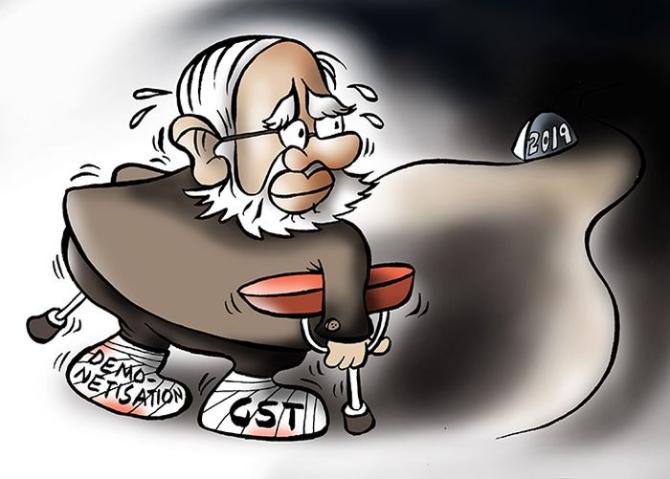'People are angry.'
'First notebandi, then GST, now losses on the farm have ruined us.'

Illustration: Uttam Ghosh/Rediff.com
In the first part of this India Spend feature, Alison Saldhana/India Spend spoke to small business owners near Mumbai to understand how demonetisation has affected their trade a year after Prime Minister Narendra D Modi outlawed Rs 500 and Rs 1,000 currency notes.
In this concluding segment of the feature, she discovers that Modi's appeal to this constituency remains largely intact despite the hardships they have endured.
"Who wants to get their hopes high? Anytime the government can decide anything it wants -- we are left with no choice but to just deal with it," said Narayan Chaudhari, a shopkeeper in the Ghodbunder area of Thane, who reported over 50 per cent losses.
"Only big businesses can survive in this climate," he said, a common refrain across stores in the urbanised parts of Palghar, Thane and Mumbai districts.
"Big supermarkets like D-Mart buy in such large quantities that companies can sell to them at even bigger discounts. So even if they offer goods to customers at amazing discounts they are still earning a profit," said 18-year-old Ashish Dharaviya whose family-run kirana store in Borivali reported 50 per cent losses over the last year.
"Obviously people will flock to them -- how do we compete?" Ashish asked.
Still, two of the 17 stores we revisited said they were hopeful business would improve, in six months to a year from now.
"Even if prices rise, these are basic goods. People will have to buy to survive," said Raksha Patel, 19, who said the situation in her shop was back to normal, and was unaffected by GST.
"Everything is as it was before. Nothing better, nothing worse."
After initial surge, digital payments report a slump
In the days after demonetisation, the government's demonetisation narrative changed from an attack on 'black money' and 'fake currency' to the promise of a 'cashless/digital' economy.
During our visit to kirana stores, we found that 12 of the 17 stores' owners did not have a mobile wallet to offer customers a digital payment option.
In January 2017, four of these 17 shopkeepers had owned digital wallets, and the number had gone up to five in 10 months.
It was mainly shop owners in urbanised areas who chose to maintain this option.
Only two of the 17, located in the densely populated areas of Vasai and Mumbai, used point of sale (PoS) machines, down from five in January 2017.
Three shopkeepers had cancelled their request for PoS machines.

Source: IndiaSpend interviews
"Running this shop on cash is itself so expensive now. Who's going to bother keeping other options," said Ramesh Kumar, 34, a shopkeeper in Kupari Naka, Virar, a rural fringe of the Mumbai Metropolitan Region..
All shopkeepers using PoS machines and mobile wallets said customers prefer to pay by cash.
In January 2017, more than half of the interviewed store owners (14 of 24) had said their stores were too small and sales too little in value to warrant cashless modes of payment.
They had also said that like themselves, their customers were not educated or wealthy enough for such options, as IndiaSpend had reported.
With the value of cash in circulation now restored to nearly 92 per cent, about half, or eight of 17 kirana owners, now reported choosing cash because customers prefer it anyway, while the rest said these technologies were beyond their customers' literacy levels.
While digital payments have not seen an uptake, eight store owners, all located in urban areas, said they now accept and receive cheques as an alternative method of payment.
In January 2017, only one shopkeeper had reported accepting or receiving cheques.
"We get cheque payments, but this too has reduced as compared to some months ago since cash flow is back to normal," said Mahendra Chheda, a shopkeeper in Dahisar, Mumbai's northernmost suburb, adding that he receives five to six cheques a month as payment from customers.
Notably, all shopkeepers now reported being aware of cashless technologies, compared with 35 per cent who were not previously.
Despite this increased awareness, 16 of 17 kirana store owners did not report using banking services more than they earlier did.
In fact, more than half the shopkeepers we met, in rural and semi-urban areas, reported using these services even more rarely as earnings have plummeted, hitting savings and investments.
"We are hardly making money to bother going to the bank. Whatever we earn goes to the house or back to the shop," said Nilesh Patil, a shopkeeper based in Kawad in Thane district, who said his shop is facing losses of 50 per cent.
"The bank itself would reject our tiny deposits."

IMAGE: Nilesh Patil, right, runs Sadguru Krupa Stores in Kawad, currently in losses of over 50 per cent. His joint family of nine members depend entirely on the shop's income. Photograph: Alison Saldanha/IndiaSpend
Yet, continuing support for Modi
Off the Bhiwandi-Wada highway, kirana store owner Ambika Kumbhar said savings and investments aside, losses and inflation have hit her home budget.
"Earlier we could make more food for the house because we could afford more. Now we make lesser. This is how we cope," she said.
While her store has now recovered some of the 75 per cent losses it suffered in January 2017, it still suffers a 25 per cent loss.
The shop, which stays shut during the monsoon season, is the primary source of income for the family of potters, traditionally set on the lowest rung of the Maharashtrian Hindu caste order.
They also sell a pot or two a month for Rs 50 to Rs 100, she said.
"A couple of months ago, I found Rs 10,000 in old notes kept in an old book. I had saved it from years ago and had completely forgotten about it. By then the banks had stopped exchanging currency so they became useless pieces of paper," said Kumbhar, her hands shaking, her voice terse.
"It felt like 500 pots crashing."

IMAGE: Ambika Kumbhar runs the Shree Swami Samarth kirana store which has recovered 50 per cent of the losses reported in January 2017. After this, the store is now running at a 25 per cent loss. Photograph: Alison Saldanha/IndiaSpend
Kumbhar said it would take years to recover the losses her family had suffered.
Yet, her allegiance to the BJP and to PM Modi remains intact.
"We support Modi because we are from Gujarat, he is of our community. Our village supports the BJP, so we do too," Kumbhar said, adding, "I have been so angry, but what can we do? We just have to let it go. The effect is not as much on us as it would be on richer people."
Ten of the 17 store owners we revisited continued to support the BJP and the prime minister. This is one fewer than in January.

Source: IndiaSpend interviews
Among those who still support the BJP, six, including Kumbhar, cited village or community ties as their reason.
Two said they had no choice since the Opposition still does not offer a strong leader to replace Modi.
However, in rural areas, fewer shopkeepers now support the BJP.
"How can we support them after what they have done to us in the last one year? Modi made the rich richer, the poor poorer," said Patil, the store owner from Hivali. She had previously supported demonetisation and the prime minister.
"People are angry. First notebandi, then GST, now losses on the farm have ruined us. We are not as enthusiastic as before. The Shiv Sena has also been capitalising on this, rallying villagers against the BJP," said Vasant Bohir, 55, another kirana store owner and resident of the village.
Across the board, BJP supporters included, 90 per cent of the store owners we revisited (15 of 17) said they failed to see the point of demonetisation, and that it had been of no use to them.
"Where have we got back any black money? Those who had to get away, got away," said Kamlakar Patil, a kirana owner in Dugad village, off the Wada highway, who said his store had faced 50 per cent losses.
Yet, he supported the BJP: "Their intentions are good, just the implementation is bad."
Ten months ago, eight of these 17 shopkeepers, including Kamlakar Patil, had supported the government's demonetisation decision.
At that time, Patil had said he hoped demonetisation would weed out the black money circulating among the rich, and bring justice to the poor.
"It may have been good for the government, but what good came of it for us? Nothing has changed except for our losses," said shopkeeper Lalita Patil, a BJP supporter, back at Vishwabharti Phata.
"Chalo, hume kuchh naya to dekhne mila (Well, at least we got to see something new)," said Kishan Chaudhary of Virar, also a BJP supporter, who reported losses of 40 per cent.
Alison Saldanha is an Assistant Editor at IndiaSpend.
Powered by  Indiaspend.org is a data-driven, public-interest journalism non-profit.
Indiaspend.org is a data-driven, public-interest journalism non-profit.










